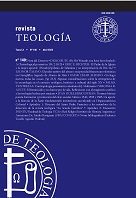The Father of the Church and the woman apostle: (Pseudo)Epiphanius of Salamis and his interpretation of Rm 16,7
DOI:
https://doi.org/10.46553/teo.60.140.2023.p35-54Palavras-chave:
Epístola a los Romanos, Junia, Lista de discípulos, Interpretación patrísticaResumo
Since the beginning of the modern debate about the gender and apostolicity of Junia (Rm 16,7), numerous interpreters have resorted to the patristic interpretation of the passage to determine its meaning, leaving aside even the philological analysis of the New Testament Greek text. Detractors of Junia’s feminine gender have appealed to the statement of Epiphanius of Salamis (c. 315-403) in his Index Discipulorum, where Junia(s) is considered to be a man and Bishop of Apameia. This statement is regarded as historically reliable and proof that Junia was not a female apostle. Since an early Greek father like Epiphanius interpreted Romans 16,7 in this way, it is considered to be the most likely interpretation. This research analyzes the arguments put forward by the defenders of this position. Four conclusions are presented. In the first place, Epiphanius of Salamis is not the author the Index Discipulorum, but rather it is a medieval pseudo-epigraphical work. Second, the information provided by this work is not historically reliable, but rather fictitious and anachronistic in nature. Third, the work seems to present gender biases against the inclusion of women in the circle of disciples. Finally, it is concluded that the interpreters who appeal to this argument make a selective use of the available evidence.
Downloads
Referências
Aland, Barbara, et al., Novum Testamentum Graece, 28va ed. Stuttgart: Deutsche Bibelgesellschaft, 2012.
Altaner, Berthold. Patrología. Madrid: Espasa-Calpe, 1956.
Bauckham, Richard. Gospel Women: Studies of the Names Women in the Gospel. Grand Rapids, MI: Eerdmans, 2002.
Belleville, Linda. «Ἰουνιαν… ἐπίσημοι ἐν τοῖς ἀποστόλοις: A Re-examination of Romans 16.7 in Light of Primary Source Materials». New Testament Studies 51, no. 2 (2005): 231-249.
Berkowitz, Luci y Karl A. Squitier, eds. Thesaurus Linguae Graecae: Canon of Greek Authors and Works. New York: Oxford University Press, 1986.
Berkowitz, Luci y Karl A. Squitier, eds. Thesaurus Linguae Graecae: Canon of Greek Authors and Works. New York: Oxford University Press, 1990.
Brooten, Bernadette. «“Junia… Outstanding among the Apostles” (Romans 16:7)». En Women Priests: A Catholic Commentary on the Vatican Declaration, ed. por Leonard y Arlene Swidler. New York: Paulist Press, 1977.
Bruce, Frederick F. The Epistle of Paul to the Romans: An Introduction and Commentary. Grand Rapids, MI: Eerdmans, 1966.
Burer, Michael H. y Daniel B. Wallace. «Was Junia Really an Apostle? A Reexamination of Rom 16.71». New Testament Studies 47, no. 1 (2001): 76-91.
Cervin, Richard. «A Note Regarding the Name “Junia(s)” in Romans 16.7», New Testament Studies 40 (1994): 464-470.
Dolbeau, François. «Listes latines d’apôtres et de disciples, traduites du grec». Apocrypha 3 (1992): 259-278.
Dolbeau, François. «Une liste ancienne d’apôtres et de disciples, traduite du grec par Moïse de Bergame». Analecta Bollandiana 104, no. 3-4 (1986): 299-314.
Dolbeau, François. Prophètes, apôtres et disciples dans les traditions chrétiennes d'Occident: Vies brèves et listes en latín. Bruxelles: Société des Bollandistes, 2012.
Epifanio el Monje. Vida de María. Trad. por Guillermo Pons Pons. Madrid: Ciudad Nueva, 1996.
Epp, Eldon J. «Text-Critical, Exegetical, and Socio-Cultural Factors affecting the Junia/Junias Variation in Romans 16,7». En New Testament Textual Criticism and Exegesis, Festschrift J. Delobel, ed. por A. Denaux. Bibliotheca Ephemeridum Theologicarum Lovaniensium 161. Leuven: Leuven University Press, 2002.
Epp, Eldon J. Junia: The First Woman Apostle. Philadelphia, PA: Fortress Press, 2005.
Fábrega, Valentín. «Was Junia(s), Der Hervorragende Apostel (Rom. 16,7), Eine Frau?». Jahrbuch für Antike und Christentum 27-28 (1984-1985): 47-64.
Fitzmyer, Joseph A. Romans: A New Translation with Introduction and Commentary. The Anchor Bible 33. New York: Doubleday, 1992.
Frank, trad. The Panarion of Epiphanius of Salamis, Book I (Sects 1-46), 2da ed. Leiden: Brill, 2009.
Guignard, Christophe. «Greek Lists of the Apostles: New Findings and Open Questions», Zeitschrift für Antikes Christentum 20, no. 3 (2016): 469-495.
Guignard, Christophe. «Les listes grecques d’apôtres et de disciples du Christ: présentation d’un project de recherche». Bulletin de l'AELAC 22-23 (2012): 29-34.
Hammond Bammel, Caroline P. Der Römerbriefkommentar des Origenes: Kritische Ausgabe der Übersetzung Rufins, 3 vols., Vetus Latina: Aus der Geschichte der lateinischen Bible 16, 22, 34. Freiburg: Herder, 1990, 1997, 1998.
Harding, Michael W. «Female Apostleship in Romans 16:7». Detroit Baptist Seminary Journal 21 (2016): 59-86.
Hartmann, Andrea. «Junia – A Woman Lost in Translation: The Name ΙΟΥΝΙΑΝ in Romans 16:7 and its History of Interpretation». Open Theology 6, no. 1 (2020): 646-660.
Horrell, David G. «Leadership Patterns and the Development of Ideology in Early Christianity». Sociology of Religion 58, no. 4 (1997): 323-341.
Jaffers, James. Conflict at Rome: Social Order and Hierarchy in Early Christianity. Minneapolis, MN: Fortress Press, 1991.
Kurek-Chomycz, Dominika. «Lehreh ja – aber nicht ex cathedra: Frauen aus den Paulusbriefen in der patristischen Literatur». En Biblische Frauenfiguren in der Spätantike, ed. por Agnethe Siquans y Markus Vinzent. Stuttgart: Kohlhammer, 2022.
Lampe, Peter. From Paul to Valentinus: Christians at Rome in the First Two Centuries. Minneapolis, MN: Fortress Press, 2003.
Metzger, Bruce M. «Names for the nameless in the New Testament: A Study in the Growth of Christian Tradition». En New Testament Studies: Philological, Versional, and Patristic, ed. por Bruce M. Metzger. Leiden: Brill, 1980.
Metzger, Bruce M. «Seventy or Seventy-two Disciples?». New Testament Studies 5, no. 4 (1959): 299-306.
Migne, J. P., ed. Patrologia Graeca, 162 vols. Paris, 1857-1886.
Ng, Esther Yue L. «Was Junia(s) in Rom 16:7 a Female Apostle? And so what?». Journal of the Evangelical Theological Society 63, no. 3 (2020): 517-533.
Piper, John y Wayne Grudem. «An Overview of Central Concerns: Questions and Answers». En Recovering Biblical Manhood & Womanhood: A Response to Evangelical Feminism, ed. por John Piper y Wayne Grudem. Wheaton, IL: Crossway Books, 1991).
Power Georges, Robyn. What Christ did for Women. Bloomington, IN: Xlibris, 2011.
Preato, Dennis J. «Junia, a Female Apostle: An Examination of the Historical Record». Priscilla Papers 32, no. 2 (2019): 8-15.
Quasten, Johannes. Patrología, 4 vols. Madrid: Biblioteca de Autores Cristianos, 1977.
Richter, Eric E. «¿Una mujer apóstol en el cristianismo primitivo? Análisis filológico e historiográfico de Romanos 16,7». Tesis de licenciatura, Universidad Adventista del Plata, Facultad de Teología, 2021.
Schermann, Theodore. Prophetarum vitae fabulosae, Indices apostolorum discipulorumque Domini, Dorotheo, Epiphanio, Hippolyto aliisque vindicata, inter quae nonnulla primum edidit. Leipzig: Teubneri, 1907.
Starowieyski, M. «List of the Apostles». En Encyclopedia of Ancient Christianity, ed. por Angelo Di Berardino, 3 vols. Downers Grove, IL: IVP Academic, 2014.
Stuhlmacher, Peter. Der Brief an die Römer. Das Neue Testament Deutsch 6. Göttingen: Vandenhoeck, 1998.
Thorley, John. «Junia, A Woman Apostle», Novum Testamentum 38, no. 1 (1996): 18-29.
Velasco-Delgado, Argimiro, ed. Eusebio de Cesarea: Historia eclesiástica, texto bilingüe. Madrid: Biblioteca de Autores Cristianos, 2008.
Downloads
Publicado
Como Citar
Edição
Secção
Licença
Direitos de Autor (c) 2023 Teología

Este trabalho encontra-se publicado com a Licença Internacional Creative Commons Atribuição-NãoComercial-CompartilhaIgual 4.0.


















 Teología
Teología